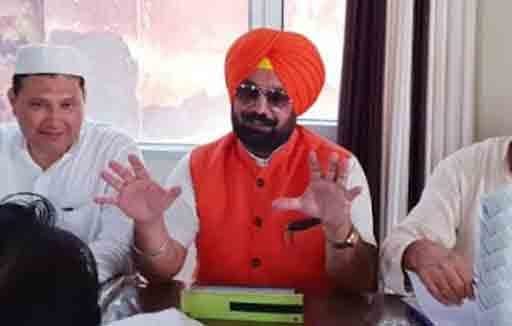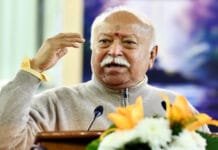BJP’s Grewal Slams AAP Over Religious Bias in Proposed Legislation
In a politically charged development ahead of Punjab’s special Assembly session on July 10 and 11, Senior BJP leader Sukhminderpal Singh Grewal has unleashed a sharp critique of the Bhagwant Mann-led Aam Aadmi Party (AAP) government, accusing it of blatant religious bias in the much-anticipated Sacrilege Bill. Grewal, a prominent Sikh voice and national-level BJP leader from Punjab, asserted that the bill in its current draft unfairly isolates protection to a single faith while neglecting the deeply revered Hindu temples and idols, which have also come under repeated attack in the state.
“Sacrilege Is Sacrilege — Irrespective of Religion,” Says Grewal
Speaking at a press briefing, Grewal demanded the immediate inclusion of ‘Pran Pratishthit’ Hindu temples and idols under the bill’s provisions. His remarks come amid heightened communal sensitivities and rising demands for equal treatment of all faiths in legislative protections.
“If this government has even an ounce of sincerity left, it must include the Hindu sacred symbols in this bill. Anything less is a betrayal of the millions of Hindus in Punjab,” Grewal declared.
He highlighted the rising incidents of desecration of Hindu religious sites across the state, criticizing the ruling AAP government for its alleged silence and inaction.
Systemic Exclusion or Political Calculus?
Grewal’s accusation is not merely emotional rhetoric — it taps into the broader political undercurrent in Punjab. The selective scope of the Sacrilege Bill, as presently proposed, raises uncomfortable questions: Why are only Sikh religious texts covered? Why are Hindu deities, temples, and sacred icons ignored, despite multiple reported incidents of temple vandalism and idol desecration?
Grewal posed these questions with stinging clarity:
“Are Hindu sentiments expendable in Punjab politics? Or are they simply not vote-worthy enough for the Mann government?”
BJP Reiterates Respect for Sikhism But Urges Inclusive Legislation
While expressing unequivocal support for the inclusion of the Sri Guru Granth Sahib Ji in the bill — “a spiritual and national symbol of the highest reverence” — Grewal emphasized that this recognition must not come at the exclusion of other faiths. He reiterated that justice and respect must be equal, warning that any form of selective outrage is inherently unjust.
“This is not about religion. It’s about justice. It’s about respect. The law must be fair — or it will not be respected,” he said, adding that picking and choosing faiths in legislative protection would only further polarize communities in Punjab.
Historical Context: Desecration of Hindu Temples in Punjab
The demand for equal protection is not without historical basis. Over the past decade, Punjab has witnessed a disturbing pattern of attacks on Hindu temples, with idols smashed, sacred artifacts defiled, and community sentiments wounded. Among the most troubling were:
The 2017 desecration incident in Phagwara, where idols in a centuries-old temple were defaced.
The 2019 Amritsar temple attack, which triggered widespread protests but resulted in minimal legal follow-through.
The 2023 Jalandhar incident, in which multiple Hindu idols were found desecrated days before a religious festival.
Despite repeated assurances, investigations into these attacks have either stalled or been politically downplayed, prompting widespread disillusionment among Hindu residents in the state.
Grewal’s Warning: Avoid Weaponizing Faith for Votes
Grewal warned the ruling party against turning sacred issues into vote-bank politics, accusing AAP of catering selectively to religious sentiments to retain its core voter base.
“Enough is enough,” he said forcefully. “You cannot pretend to be secular while drafting religiously selective laws. This government cannot wash its hands of Hindu pain.”
He urged the Punjab Assembly to rise above sectarian politics and pass a comprehensive sacrilege law that includes all religious communities and clearly defines penalties for defiling any sacred symbol, scripture, or structure.
Religious Equality Must Reflect in Lawbooks, Not Just Speeches
Grewal’s intervention reopens the critical debate around religious equality in Indian state laws. While the Indian Constitution guarantees freedom of religion and equal protection of all faiths, legislative frameworks often reflect majoritarian concerns or political calculations. The current controversy surrounding the Sacrilege Bill highlights this discrepancy.
The call to include ‘Pran Pratishthit’ Hindu idols and temples isn’t simply symbolic — it’s a demand for institutional recognition of Hindu pain and legal redress for attacks that often go unpunished. In a pluralistic state like Punjab, legislation that safeguards one community while overlooking others risks undermining the very foundation of secular governance.
Public Sentiment Builds Across Communities
As the July Assembly session approaches, public sentiment is mounting. Hindu organizations, civil society groups, and interfaith leaders have begun voicing similar concerns. There is growing consensus that any bill on sacrilege must be broad-based, protecting Sikh scriptures, Hindu deities, Christian crosses, Muslim sacred sites, and Jain or Buddhist relics — in short, anything that a community holds sacred.
Punjab’s unique religious mosaic demands nothing less.
A Litmus Test for AAP’s Secular Credibility
For the Mann government, this is more than just legislative housekeeping — it is a litmus test of its secular credentials. With religious polarisation rising across India, the way this bill is crafted, debated, and passed will have statewide and national ramifications.
Will the AAP leadership rise above vote-centric lawmaking and embrace true inclusivity? Or will it further entrench communal divides by passing a law that prioritizes one community’s sanctity over another’s?
BJP Set to Raise Issue in Assembly — Political Stakes High
Sources close to the BJP confirm that the party will strongly raise the issue during the special session, with plans to submit a detailed list of past Hindu temple desecration cases and demand specific clauses that safeguard all religious icons.
The political stakes are enormous. With the 2027 Punjab elections on the horizon, how the government handles this sensitive issue could define alliances, sway swing voters, and redraw religious fault lines in the region.
Conclusion: A Demand for Justice, Not Privilege
Grewal’s demand is not about pitting one community against another. It’s a call for fairness, a plea for equal dignity, and a reminder that faith is not a political commodity. Whether it’s the Guru Granth Sahib, a shivling, a statue of Durga, or any other divine symbol, desecration wounds communities deeply — and the law must reflect that in equal measure.
As the Assembly session looms, all eyes are now on Bhagwant Mann and his cabinet. Will they expand the bill’s scope and show political maturity? Or will they stay silent — and let selective secularism cast a shadow over Punjab’s fragile harmony?















